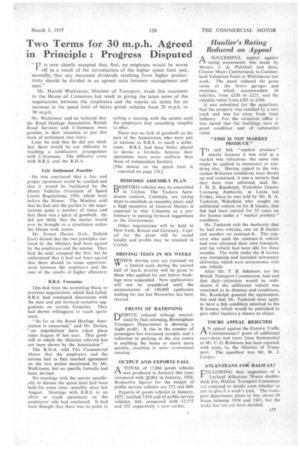Two Terms for 30 m.p.h. Agreed in Principle : Progress Disputed
Page 31

If you've noticed an error in this article please click here to report it so we can fix it.
" IT is now clearly accepted that, first, no employee would be worse off as a result of the introduction of the higher speed limit and, secondly, that any increased dividends resulting from higher productivity should be divided in an agreed ratio between management and men."
Mr. Harold Watkinson, Minister of Transport, made this statement to the House. of Commons last week in giving the latest news of the. negotiations between the employers and the unions on terms for an increase in the speed limit of heavy goods vehicles from 20 m.p.h.to 30 m.p.h.
Watkinson said he believed that the Road Haulage Association, British .Road Services and C-licensees were genuine in their intention to put this basis of settlement into force.
Later he said that he did not think that there would be any difficulty in teaching a satisfactory arrangement with C-licensees. The difficulty arose With B.R.S. and the R.H.A.
Fair Settlement Possible
He was convinced that a fair and proper 'agreement could be reached and that it would be facilitated by the Motor Vehicles (Variation of Speed Limit) Regulations, 1956, which were before the House, The Minister -said that he had met the parties to the negotiations quite a number of times and that there was a spirit of goodwill. He did not think that the matter would ever be brought to a conclusion unless the House took action.
Mr. Ernest Davies (Lab., Enfield East) denied that the two principles outlined by the Minister. bad been agreed by the employers and the unions. They had, he said, accepted the first, but be understood that it had not been agreed that there should be some apportionment between the employers and the men of the results of higher efficiency, 'B.R.S. Formulae This had been the stumbling block to previous negotiations, which had failed. B.R.S. had continued discussions with the men and put forward tentative suggestions on certain formulae. They had shown willingness to reach agreement.
" So far as the Road Haulage Association is concerned," said Mr, Davies, "no negotiations have taken place since August of last year. That goodwill to which the Minister referred has not been shown by the Association."
The R.H.A. told The Commercial Motor that the employers and the unions had in fact reached agreement on the two points mentioned by Mr. Watkinson, but no specific formula had been devised.
No meetings with the unions specifically to discuss the speed limit had been held for some time—possibly since last August. Meetings with B.R.S. in an effort to reach agreement on the employers' side had continued. It had been thought that there was no point in calling a meeting with the unions until the employers had something tangible to offer.
There was no lack of goodwill on the part of the Association, who were lust as anxious as B.R.S. to reach a settlement. B.R.S. had been better placed to devise a formula, because their operations were more uniform than those of independent hauliers.
[The debate on the speed limit is reported on page 1341 BEDFORD ASSEMBLY PLAN
BEDFORD vehicles may be assembled in Ceylon. The Tuckers Aerodrome concern, Colombo, are taking steps to establish an assembly plant, and a high executive of General Motors is expected to visit Colombo as a preliminary to putting forward suggestions to the Government.
Other negotiations will be held in New York, Britain and Germany. Capital for the plant will be raised locally and profits may be retained in Ceylon.
DRIVING TESTS IN SIX WEEKS
W,THEN driving tests are resumed on IT a limited scale during the second half of April, priority will be given to those who applied for test before bookings were suspended. New applications will not be considered until the accumulation of 140,000 applicants waiting for test last November has been cleared.
FRUITS OF RATIONING
nESPITE reduced mileage necessi
tated by fuel rationing, Birmingham Transport Department is showing a slight profit. A rise in the number of passengers has increased receipts, and a reduction in parking in the city centre is enabling the buses io move more quickly, resulting in more economical running.
OUTPUT AND EXPORTS FALL
ATOTAL of 17,866 goods vehicles was produced in January this year, compared with 2.8,801 in January, 1956. Respective figures for the output of public service vehicles are 712 and 869.
Exports of goods vehicles in January, 1957, totalled 7,916 and of public service vehicles, 644, compared with 12,575 and 332 respectively a year earlier.












































































































